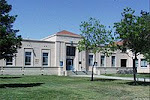Barack Obama's new science advisor is not so much a scientist as a Cassandra. The New York Times says:
"Does being spectacularly wrong about a major issue in your field of expertise hurt your chances of becoming the presidential science advisor? Apparently not, judging by reports from DotEarth and ScienceInsider that Barack Obama will name John P. Holdren as his science advisor on Saturday.
Dr. Holdren, now a physicist at Harvard, was one of the experts in natural resources whom Paul Ehrlich enlisted in his famous bet against the economist Julian Simon during the “energy crisis” of the 1980s. Dr. Simon, who disagreed with environmentalists’ predictions of a new “age of scarcity” of natural resources, offered to bet that any natural resource would be cheaper at any date in the future. Dr. Ehrlich accepted the challenge and asked Dr. Holdren, then the co-director of the graduate program in energy and
resources at the University of California, Berkeley, and another Berkeley professor, John Harte, for help in choosing which resources would become scarce.
In 1980 Dr. Holdren helped select five metals — chrome, copper, nickel, tin and tungsten — and joined Dr. Ehrlich and Dr. Harte in betting $1,000 that those metals would be more expensive ten years later. They turned out to be wrong on all five metals, and had to pay up when the bet came due in 1990.
. . . . . . . . ..
Dr. Holdren is certainly entitled to his views, but what concerns me is his tendency to conflate the science of climate change with prescriptions to cut greenhouse emissions. Even if most climate scientists agree on the anthropogenic causes of global warming, that doesn’t imply that the best way to deal with the problem is through drastic cuts in greenhouse emissions. There are other ways to cope, and there’s no “scientific consensus” on which path looks best."
OpenMarket.org says,
"Although touted as a member of the prestigious National Academy of Sciences, Holdren was admitted through a back door called the “temporary nominating group”, a process which appears designed and has certainly been exercised to gain entry for large numbers of environmental alarmists who, it is fair to presume from this exception, would not gain election through the normal channel.
. . . . . . . .
The vocal Holdren predicted in the mid-1980s that climate-related catastrophes might kill as many as one billion people before the year 2020 but now brushes off inquiries about such failed catastrophism while continuing to sound a similar alarm. He is a longtime collaborator with none other than failed prognosticator of doom Paul Ehrlich, with whom he collaborated to hold a “Cassandra Conference” in 1988 (Cassandra is the lass from Greek mythology whose prophecies were always true and always ignored).
As I note in Red Hot Lies, Holdren’s name also pops up in various, largely successful efforts to elevate taxpayer funding of the global warming industry. Finally, note that Holdren’s recent record includes being enlisted by Scientific American in its clumsy effort to smear and otherwise discredit Bjørn Lomborg."
He is not just a Cassandra but a backdoor Cassandra.
Nothing new here: even though Democrats frequently invoke the name of "science." Few of them actually know what it is and how it works.
Subscribe to:
Post Comments (Atom)





















No comments:
Post a Comment